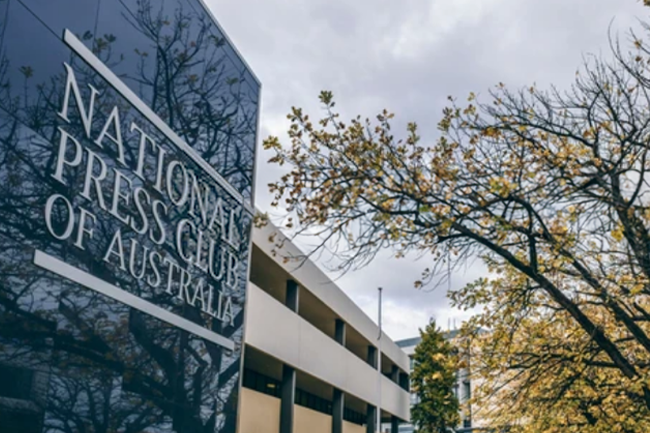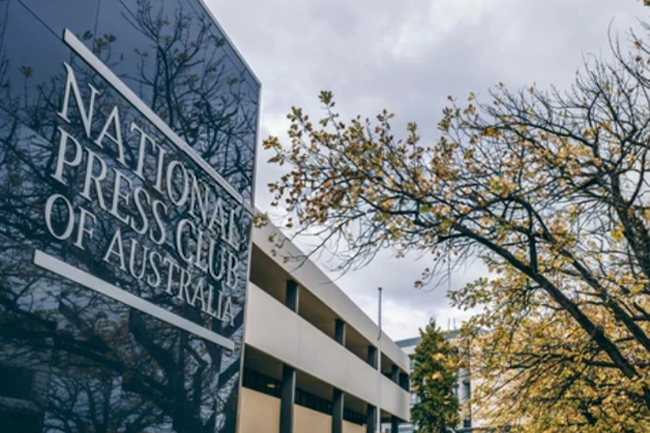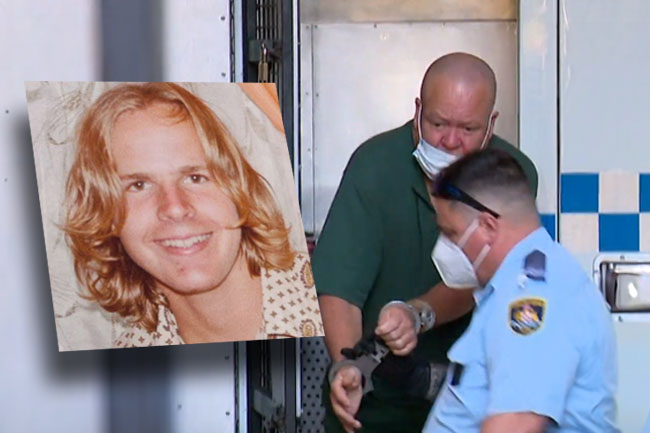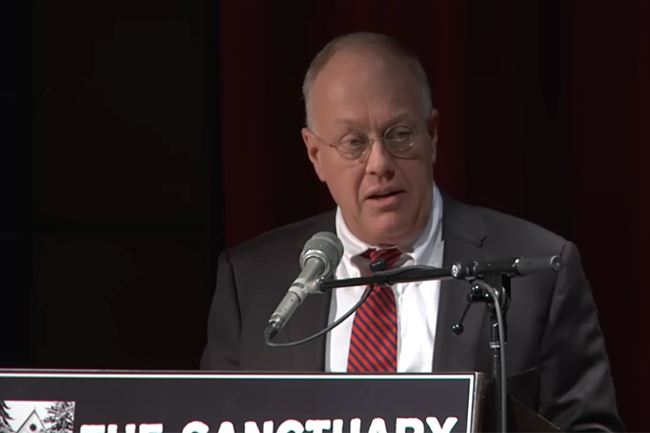When Pulitzer Prize-winner Chris Hedges was abruptly cancelled by the National Press Club, questions arose over whether its deep ties to the weapons industry are compromising journalism’s integrity, writes Dr Rosemary Sorensen.
WHEN AMERICAN JOURNALIST Chris Hedges suggested to the National Press Club of Australia that they remove the word “Press” from their title, we didn’t know just how apposite that criticism was.
Hedges was at the time responding to the abrupt cancellation of his scheduled address and the claim by NPC’s CEO Maurice Reilly that he’d never really been confirmed, and there was no pressure from anywhere to cancel him.
Yeah, right, you might have thought. David Marr on ABC Radio National’s Late Night Live program was happy enough to gloss over the way a journalist had been treated by an organisation dedicated to truth in journalism, on his way to telling Hedges off for daring to suggest failures in the reporting of Israel’s genocidal destruction of Gaza.
Someone has done some background work, following up on Reilly’s statement that it was his and the Board’s decision alone to cancel Hedges. Michelle Fahy, a writer who researches weapons industry influence, has written about the Board and sponsors of the National Press Club.
The article begins:
The National Press Club of Australia lists 81 corporate sponsors on its website.
Twenty-one of them... are either part of the global arms industry or actively working on its behalf.
Eyebrow-raising? Why would a company such as, say, Thales, which ‘is being investigated by four countries for widespread criminal activity’, seek to sponsor a journalists’ club? And, perhaps more to the point, does such a club have ‘policies or guidelines... in place that addressed the suitability and selection’ of their sponsors.
To that question put to him by Fahy, Mr Reilly said:
“The board are informed monthly about... proposals and have the right to refuse any application.”
It would be a very strange board indeed that didn’t have such a “right”, but, awaiting an answer to a request for clarification from the NPC (not yet arrived at time of writing), that must be taken, then, as a no.
At this point in her article, Fahy turns to the board members and finds there a list of people whose experience and connections might surprise you. She’s not, as she writes, ‘alleging or implying inappropriate or illegal behaviour’. It’s the ‘weapons industry’s opaque engagement in public life’ that is the issue.
Here, for example, is Fahy’s summary for Board member Gemma Daley:
Gemma Daley joined the board a year ago, having started with Ai Group as its head of media and government affairs four months earlier. Ms Daley had worked for Nationals’ leader David Littleproud, former Prime Minister Malcolm Turnbull and former Treasurer Joe Hockey and, before that, for media outlets the Financial Review and Bloomberg.
Ai Group has a significant defence focus and promotes itself as “the peak national representative body for the Australian defence industry”. The group has established a Defence Council and in 2017 appointed a former assistant secretary of the Defence Department, Kate Louis, to lead it. The co-chairs of its Defence Council are senior arms industry executives. One of them, Paul Chase, is CEO of Leidos Australia, a Press Club sponsor.
The background of board members, such as Daley and others on the NPC board, may be coincidental, when, down the track, something like an apparent backflip on a commitment to a speaker who might be seen to go against the interests of sponsors has to be dealt with. Though it appears to confound even the National Anti-Corruption Commission, it is, however, a simple question: how does an organisation deal with conflicts of interest, and how transparent are the means of accounting for any perception of conflict?
So far, Mr Reilly’s answers to Fahy’s questions are not reassuring.
Once the criss-crossing links between some board members and the weapons industry have been established, Fahy turns to how the NPC benefits financially from its weapons industry-related sponsors who ‘contribute an annual $525,000’, which is 23 per cent of earned revenue. That is a goodly proportion of the income side of the accounting sheet.
The shenanigans of the Canberra media-connected lunch crowd, and their chummy links with companies of contentious and even outright disreputable status, is disconcerting.
Yes, there’s a hefty lineup of speakers who are showcased over lunch at this Canberra institution. The winner of the Sydney Peace Prize, Judge Navi Pillay, was followed by the outgoing chair of the Australian Securities and Investments Commission, Joe Longo. After an address by UNICEF Australia’s James Elder, the Chief Executive of FutureCoal, Michelle Manook, will speak about her advocacy role. ABC Managing Director Hugh Marks, Deputy Leader of the Opposition Ted O’Brien, Minister for Veterans’ Affairs Matt Keogh: they all get a gig.
With such a busy schedule, then, the question remains: why did the Chris Hedges address need to be cancelled? Most reports, including Fahy’s, tell us that he’s a Pulitzer Prize winner, and summarising his career is impossible. But randomly picking out one highlight, we might note that in 2016, he was one of a group at the Capitol in Washington, DC to be arrested for protesting about corporate lobbying of politicians and that his 2022 book was called The Greatest Evil is War.
The decision, along with the claim that it was done in the interest of “balance”, has damaged the NPC’s reputation. Will the NPC membership respond? Do they care? Or is it just another case of riding out the kerfuffle, then carrying on, as before, accepting sponsorships that could bring with them, at the very least, conflicts of interest for their board?
I asked Fahy if the level of sponsorship of the weapons and related companies surprised her when she turned her attention to the organisation which had cancelled Chris Hedges and she said that, while she wasn’t shocked to discover that the arms industry would “attempt to inveigle its way into any arena of influence”.
Fahy was nevertheless dismayed that the iconic national press club has allowed this scenario to develop, particularly to the extent it has:
“The lack of due diligence in assessing sponsors stands out to me (both the sheer number of corporate sponsors, as well as who they are). The press is supposed to fearlessly hold power to account, yet the Press Club is now being funded by a significant number of very powerful corporations. In my view, this compromises and undermines what good journalism stands for and should be about.”
The question to the members and board of the National Press Club is: Is that your view, too?
Dr Rosemary Sorensen is an IA columnist, journalist and founder of the Bendigo Writers Festival.
 This work is licensed under a Creative Commons Attribution-NonCommercial-NoDerivs 3.0 Australia License
This work is licensed under a Creative Commons Attribution-NonCommercial-NoDerivs 3.0 Australia License
Support independent journalism Subscribe to IA.

Related Articles
- Free speech questioned as National Press Club cancels Gaza address
- Chris Hedges silenced: Press Club accused of censorship over Gaza













